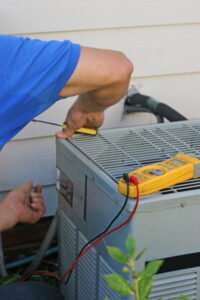Spoilers for this post: You probably don’t need more refrigerant! If you do, it’s a repair situation.
We thought we’d get the crucial information out of the way first, because people often have mistaken assumptions about how air conditioners use refrigerant. They might hear from a source that it’s a good idea to get the refrigerant “topped off” before summer rolls around, or that you’ll need to have routine refrigerant refills to ensure the AC doesn’t run out of it.
To which we’ll ask: “When was the last time you needed to have the refrigerant in your refrigerator refilled?” We’ll bet the answer is never—unless the refrigerator was broken.
Well, the refrigerant in an air conditioning system is the same. Unless the AC is leaking refrigerant (in which case call us for air conditioning repair in Eden Prairie, MN), you won’t need to have any additional refrigerant put into it during the system’s service life.
Refrigerant Isn’t Fuel, Nor Is It Motor Oil
Let’s go into more depth about refrigerant, and start with what it isn’t. The reason people have these misconceptions about refrigerant is because they think of it as fuel or motor oil—and it doesn’t do anything like these jobs.
- Fuel: No, refrigerant is not a fuel source. Your air conditioner doesn’t run on refrigerant and won’t consume it. Your air conditioner runs on electricity.
- Motor oil: An air conditioner has motors, but they aren’t huge like a car engine. They do need lubricant, and restoring the lubricant is a common job that technicians do during maintenance. Refrigerant will not degrade over time the way motor oil does.
Refrigerant Is a Heat Exchange Medium
So what is refrigerant? It’s a heat exchange medium: a chemical blend that allows the air conditioner to absorb heat in one location and release it in another. The refrigerant goes through a process of evaporation and condensation, turning from a gas to a liquid and back again as it circulates.
The refrigerant doesn’t dissipate during this process as it moves through the closed system of loops. Under normal conditions, the amount of refrigerant in an air conditioner (known as the AC’s charge) will never change.
Now Let’s Talk About Leaks
Conditions aren’t always normal, and an air conditioning system can end up in a situation where it needs to have more refrigerant put into it. The refrigerant charge in an AC will drop if there are leaks in the refrigerant lines, the coils, or connection points.
When an air conditioner has a low charge because of leaks, it’s a serious problem. The low charge alters the pressure inside the system, which causes the AC to work at lower efficiency. The big long-term danger is that low refrigerant will lead to the compressor overheating and burning out—and then the entire AC will need to be replaced.
Regular maintenance is your best tool against leaks. During a maintenance inspection, our technicians will closely inspect your AC and check the refrigerant pressure. If we discover the AC has lost its charge, we’ll seal the leaks and then restore the correct amount. Each air conditioner must run at a specific charge, and only professional technicians can handle the recharging.
Contact Residential Heating and Air Conditioning and Feel the Difference!

